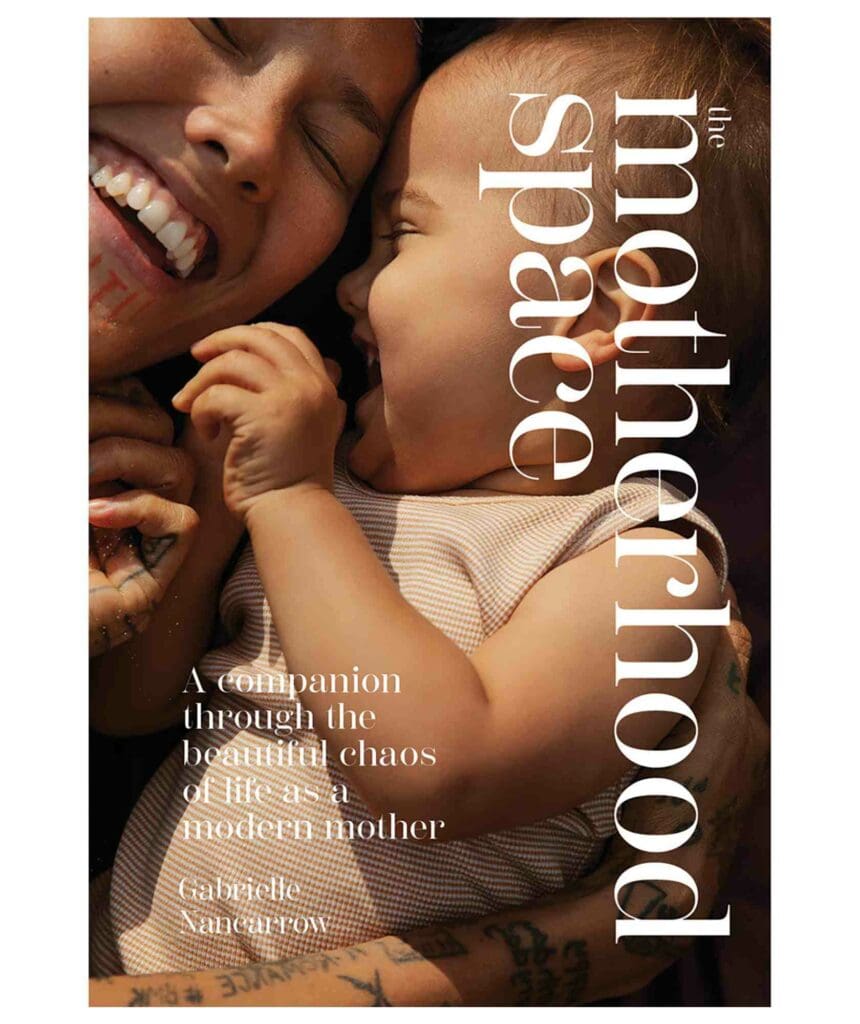Doula and writer Gabrielle Nancarrow talks to Capsule about her new book, The Motherhood Space, and why it was important to her to make this space as inclusive as possible for the many different stories that bring someone to motherhood.
How do you write about motherhood? Well, carefully. To try and put into words the extraordinary, ordinary world of motherhood is to try and tell a story about the following kinds of people: those who get pregnant and have a baby, those who get pregnant and lose a baby, those who want a baby and don’t get pregnant, those who get pregnant and don’t want a baby, those who aren’t sure if they want children, those who definitely don’t want children, those who do want children but it never happens for them. All of those lived realities dwell within that one label: Mother.

“There are as many experiences of motherhood as there are mothers in the world,” writes Gabrielle Nancarrow in the introduction to her exquisite new title, The Motherhood Space. Her goal was to create a book that held as many of those stories as possible, so before she even worked out what the book would be, she started reaching out to different people: mothers, non-mothers, caregivers, academics, professionals working in the motherhood or caregiving space.
What came out of that was over 50 hours of conversation, and some very clear themes. The Motherhood Space: A Companion Through The Beautiful Chaos of Life As a Modern Mother was the final result, a conversational guide through the joys, stages and rages of becoming a mother.
“It’s too raw to think about motherhood as a positive or negative thing,” she tells Capsule. “It’s everything – that’s why it’s important to have the language to support that. Motherhood is really hard and it’s also really joyous; it’s okay to feel the two things at once.”
For Gabrielle, having children was the impetus to change her entire life. Before she gave birth to her first daughter, she was living a high-speed, high-gloss life in New York as the editorial director of Victoria’s Secret. After Camille turned up, Gabrielle did what all of her peers were doing and went back to her job quickly, returning to full time work when Camille was four months old. But she missed her baby and found that she no longer had the sole spotlight on work that allowed for the life takeover such a job required. So, she and her husband uprooted their fast-paced US lives and moved back to Gabrielle’s native Australia.
“I became a bit of a ‘birth nerd’ postpartum, after having a good experience birth wise,” she says, on the start of that career switch. “I wanted to learn more, I wanted to hear more stories; like a lot of us do, I became obsessed with birth.”
But the shifts were still to come – after giving birth to their second daughter, Audrey, Gabrielle retrained as a birth doula and opened up Gather, a community space in Melbourne for birth education. During the pandemic while pregnant with her third child, Freddie, Gabrielle wrote her first book, The Birth Space: A Doula’s Guide To Pregnancy, Birth & Beyond. It was to fill what she saw as a gap in the market – the available offerings “weren’t conversational, they weren’t inclusive.” At the end of The Birth Space, she included a chapter on Matrescence – the physical, mental, emotional and societal transition to becoming a mother – but kept the focus of the book on birth.
But the conversations she was having with clients, with pregnant friends and family members, confirmed for Gabrielle that there was a wider story she wanted to tell. Pregnancy and birth are, simply put, only the start of the journey – but that made it an easier book to write. The Motherhood Space, however, would have to somehow encompass the wild, varied and often very complicated path that people take to become mothers.
And it would also have to cover loss. Early on in the book, Gabrielle sums up the profound mental shift that marks the start of motherhood: “…The moment we start longing for a child, we are never truly alone again,” she writes. It’s a simple phrase that creates a lot of space for all the hopeful stories that lead to the motherhood space. Gabrielle’s own journey to becoming a mother started with loss, as her first pregnancy ended in a miscarriage at nine weeks and the experience of that shaped all of her pregnancies that followed.
“No matter what kind of loss it is, whether it’s a termination or a miscarriage or a stillbirth or a loss in infancy, it will affect so much of our story going forward,” she says. “Of our next pregnancies, of our next birth, of how we parent. Pregnancy loss is a really important part to include, because it’s part of motherhood. I saw that baby, I lost that baby, that baby will always be a part of me and our family.”
No matter how someone comes to motherhood, Gabrielle’s aim with The Motherhood Space is to make mothers feel less alone, and also know that their stories matter.
“Motherhood is a massive identity shift of letting go of who we were before,” she says. “We need to take up space with our stories so that women know that it’s okay that they’re going through this.”
To read the 50 different stories that make up The Motherhood Space, find out more information on where you can buy the book here

